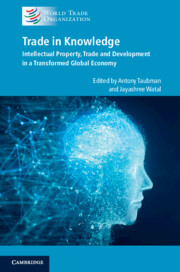Book contents
- Frontmatter
- Contents
- Figures
- Tables
- Contributors
- Preface
- 1 Thematic Overview: Charting the Evolution of Knowledge Flows
- Part I Conceptual Framework
- Part II Measuring Trade in Knowledge
- Part III Impact of Knowledge Flows on Trade and Development
- Part IV Policy, Regulatory and Legislative Frameworks
- Part V Looking Forward
- Index
1 - Thematic Overview: Charting the Evolution of Knowledge Flows
Published online by Cambridge University Press: 17 February 2022
- Frontmatter
- Contents
- Figures
- Tables
- Contributors
- Preface
- 1 Thematic Overview: Charting the Evolution of Knowledge Flows
- Part I Conceptual Framework
- Part II Measuring Trade in Knowledge
- Part III Impact of Knowledge Flows on Trade and Development
- Part IV Policy, Regulatory and Legislative Frameworks
- Part V Looking Forward
- Index
Summary
Understanding cross-border flows of knowledge, often associated with transactions involving intellectual property (IP), is essential to analysing how modern economies grow and evolve, and how international trade can underpin technological development. How to stimulate knowledge flows and make more effective, systematic use of them is an immediate practical concern for contemporary policymakers and analysts seeking to frame and implement policies for economic and technological development, that strengthen innovation systems and tap into indigenous creative and innovative capacity. Trade is understood to serve as a major conduit for the knowledge dissemination and technology spillovers that are essential for sustainable development today. And the IP system has been crafted and implemented ostensibly to facilitate both innovation and the dissemination of the fruits of innovation. Trade in knowledge as such – transactions specifically over the licensing or transfer of IP rights, for instance – has become a practical reality and a major source of dynamism and disruption. The complex and dynamic interaction between the IP system and international trade is therefore critical to our understanding of knowledge flows and their contribution to development.
- Type
- Chapter
- Information
- Trade in KnowledgeIntellectual Property, Trade and Development in a Transformed Global Economy, pp. 1 - 24Publisher: Cambridge University PressPrint publication year: 2022



